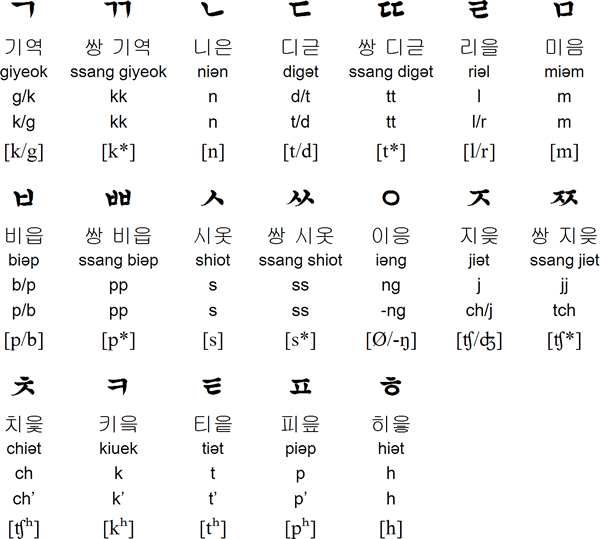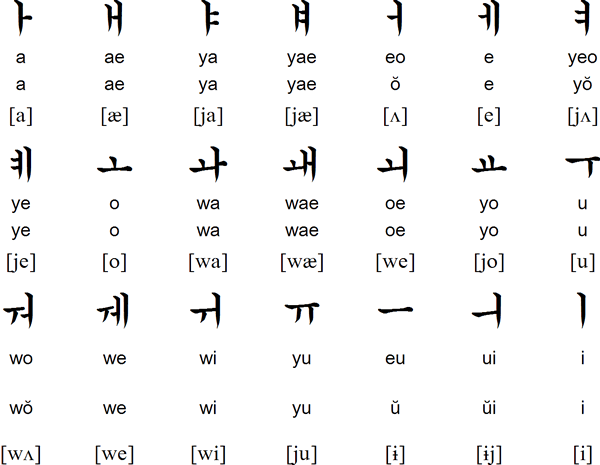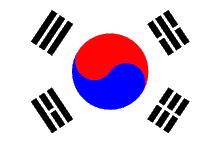Sentence: We need to talk.
우리woo ri
는noon
대화da wha
가ga
필요합pil yo hap
니다ni da
.
우리
woo ri
1. we, us, my, our 2. cage, hutch (of animal)
는
noon
1. (particle after subject or object word) 2. (particle to make adjective) 3. (particle to add emphasis) 4. (particle between verb and relative pronoun) 5. (particle in verb to make progressive form)
대화
da wha
conversation, dialogue
가
ga
1. (particle after subject or object word) 2. edge, rim 3. person, man 4. family 5. (particle after word to add emphasis) 6. if ~ or not
필요하다
pil yo ha da
to need
니다
ni da
(particle after verb to complete sentence, polite tone)
Sentence: We need to talk.
우리woo ri
는noon
대화da wha
가ga
필요합pil yo hap
니다ni da
.
♥¸¸.•*¨*•♫♪♪♫•*¨*•.¸¸♥¸¸.•*¨*•♫♪♪♫•*¨*•.¸¸♥
Sentence: Are you really going to write me a postcard? Yes, of course!
정말jung mal
로ro
엽서yup suh
를rool
보내bo ne
줄jool
거guh
에e
요yo
?
예ye
,
물론mool lon
이i
죠jyo
!
정말jung mal
really, truly
로ro
with, in, as (particle after word to add meaning of 'method', 'way')
엽서yup suh
postcard
를rool
Infinitive: 을
wool
(particle after object word) 보내bo ne
Infinitive: 보내다
bo ne da
to send off, to dispatch, to mail, to remit 줄jool
Infinitive: 주다
joo da
to give, to offer 거guh
Infinitive: 것
gut
what, the thing which (used to create noun phrases) 에e
Infinitive: 이다
i da
to be (+ adjective or noun to describe something) 요yo
(particle after verb to make semi-polite question)
예ye
yes, right
물론mool lon
of course, needless to say
이i
Infinitive: 이다
i da
to be (+ adjective or noun to describe something) 죠jyo
(short form of 'particle after verb or adjective to finish sentence or to ask question, casual tone' + 'particle after verb to add semi-politeness')
정말
jung mal
1. truth, honesty 2. really, truly
로
ro
1. with, in, as (particle after word to add meaning of 'method', 'way') 2. road, street 3. to, towards 4. because of 5. (particle that comes after time)
엽서
yup suh
postcard
을
wool
1. (particle after object word) 2. (particle in verb to add meaning of 'perhaps')
보내다
bo ne da
1. to send off, to dispatch, to mail, to remit 2. to spend (time)
주다
joo da
to give, to offer
것
gut
1. thing, object 2. what, the thing which (used to create noun phrases) 3. that, which (relative pronoun) 4. (particle in verb to add meaning of personal guess or opinion)
이다
i da
1. to be (+ adjective or noun to describe something) 2. (particle in verb to add meaning of passivity)
요
yo
1. (particle after verb to make semi-polite question) 2. (particle after verb to finish sentence in semi-polite tone)
예
ye
yes, right
물론
mool lon
of course, needless to say
죠
jyo
(short form of 'particle after verb or adjective to finish sentence or to ask question, casual tone' + 'particle after verb to add semi-politeness')
Sentence: Are you really going to write me a postcard? Yes, of course!
정말jung mal
로ro
엽서yup suh
를rool
보내bo ne
줄jool
거guh
에e
요yo
?
예ye
,
물론mool lon
이i
죠jyo
!
정말jung mal
really, truly
로ro
with, in, as (particle after word to add meaning of 'method', 'way')
엽서yup suh
postcard
를rool
Infinitive: 을
wool
(particle after object word) 보내bo ne
Infinitive: 보내다
bo ne da
to send off, to dispatch, to mail, to remit 줄jool
Infinitive: 주다
joo da
to give, to offer 거guh
Infinitive: 것
gut
what, the thing which (used to create noun phrases) 에e
Infinitive: 이다
i da
to be (+ adjective or noun to describe something) 요yo
(particle after verb to make semi-polite question)
예ye
yes, right
물론mool lon
of course, needless to say
이i
Infinitive: 이다
i da
to be (+ adjective or noun to describe something) 죠jyo
(short form of 'particle after verb or adjective to finish sentence or to ask question, casual tone' + 'particle after verb to add semi-politeness')
♥¸¸.•*¨*•♫♪♪♫•*¨*•.¸¸♥¸¸.•*¨*•♫♪♪♫•*¨*•.¸¸♥
Sentence: I had breakfast, and shortly afterwards I drove into town.
저juh
는noon
아침a chim
식사sik sa
를rool
한han
뒤dwui
곧got
시내si ne
로ro
차cha
를rool
몰mol
고go
나갔na gat
습soop
니다ni da
.
저juh
I, me (polite tone)
는noon
(particle after subject or object word)
아침a chim
morning
식사sik sa
meal, diet, eating, dining
를rool
Infinitive: 을
wool
(particle after object word) 한han
Infinitive: 하다
ha da
to do 뒤dwui
after, next
곧got
soon, straightforwardly
시내si ne
city, town, downtown
로ro
to, towards
차cha
car
를rool
Infinitive: 을
wool
(particle after object word) 몰mol
Infinitive: 몰다
mol da
to drive 고go
(particle after verb or adjective to add meaning of progression)
나갔na gat
Infinitive: 나가다
na ga da
to go out, to exit 습soop
(particle in verb to add politeness, formal)
니다ni da
(particle after verb to complete sentence, polite tone)
저
juh
1. I, me (polite tone) 2. that
는
noon
1. (particle after subject or object word) 2. (particle to make adjective) 3. (particle to add emphasis) 4. (particle between verb and relative pronoun) 5. (particle in verb to make progressive form)
아침
a chim
1. morning 2. breakfast
식사
sik sa
meal, diet, eating, dining
을
wool
1. (particle after object word) 2. (particle in verb to add meaning of 'perhaps')
하다
ha da
1. to do 2. to be (+ adjective or noun to describe something) 3. to have to, must
뒤
dwui
1. behind, back, rear 2. after, next
곧
got
soon, straightforwardly
시내
si ne
city, town, downtown
로
ro
1. with, in, as (particle after word to add meaning of 'method', 'way') 2. road, street 3. to, towards 4. because of 5. (particle that comes after time)
차
cha
1. car 2. tea 3. time, turn, order
몰다
mol da
1. to drive 2. to corner
고
go
1. (particle after word, phrase or clause to add meaning of 'and') 2. (particle after verb to be placed in front of verbs meaning 'hope','wish') 3. (particle after phrase or clause) 4. (particle after verb or adjective to add meaning of progression)
나가다
na ga da
to go out, to exit
습
soop
(particle in verb to add politeness, formal)
니다
ni da
(particle after verb to complete sentence, polite tone)
Sentence: I had breakfast, and shortly afterwards I drove into town.
저juh
는noon
아침a chim
식사sik sa
를rool
한han
뒤dwui
곧got
시내si ne
로ro
차cha
를rool
몰mol
고go
나갔na gat
습soop
니다ni da
.
저juh
I, me (polite tone)
는noon
(particle after subject or object word)
아침a chim
morning
식사sik sa
meal, diet, eating, dining
를rool
Infinitive: 을
wool
(particle after object word) 한han
Infinitive: 하다
ha da
to do 뒤dwui
after, next
곧got
soon, straightforwardly
시내si ne
city, town, downtown
로ro
to, towards
차cha
car
를rool
Infinitive: 을
wool
(particle after object word) 몰mol
Infinitive: 몰다
mol da
to drive 고go
(particle after verb or adjective to add meaning of progression)
나갔na gat
Infinitive: 나가다
na ga da
to go out, to exit 습soop
(particle in verb to add politeness, formal)
니다ni da
(particle after verb to complete sentence, polite tone)
♥¸¸.•*¨*•♫♪♪♫•*¨*•.¸¸♥¸¸.•*¨*•♫♪♪♫•*¨*•.¸¸♥
Sentence: I've forgotten my password again!
비밀번호bi mil bun ho
를rool
또to
잊어i juh
버렸buh ryut
습soop
니다ni da
!
비밀번호bi mil bun ho
password
를rool
Infinitive: 을
wool
(particle after object word) 또to
again, more, also
잊어i juh
Infinitive: 잊다
it da
to forget 버렸buh ryut
Infinitive: 버리다
buh ri da
to do completely (+ verb) 습soop
(particle in verb to add politeness, formal)
니다ni da
(particle after verb to complete sentence, polite tone)
비밀번호
bi mil bun ho
password
을
wool
1. (particle after object word) 2. (particle in verb to add meaning of 'perhaps')
또
to
again, more, also
잊다
it da
to forget
버리다
buh ri da
1. to throw away 2. to do completely (+ verb)
습
soop
(particle in verb to add politeness, formal)
니다
ni da
(particle after verb to complete sentence, polite tone)
Sentence: I've forgotten my password again!
비밀번호bi mil bun ho
를rool
또to
잊어i juh
버렸buh ryut
습soop
니다ni da
!
비밀번호bi mil bun ho
password
를rool
Infinitive: 을
wool
(particle after object word) 또to
again, more, also
잊어i juh
Infinitive: 잊다
it da
to forget 버렸buh ryut
Infinitive: 버리다
buh ri da
to do completely (+ verb) 습soop
(particle in verb to add politeness, formal)
니다ni da
(particle after verb to complete sentence, polite tone)
♥¸¸.•*¨*•♫♪♪♫•*¨*•.¸¸♥¸¸.•*¨*•♫♪♪♫•*¨*•.¸¸♥
예, ye, = yes, right
나가다, nagada, = to go out, to exit
버리다, buh ri da, = 1. to throw away 2. to do completely (+ verb)
버팔로
buh pal loh
= buffalo
Yesterday's Words:
슬프다
sool poo da
= sad, unhappy
[Details] | |
몰다
mol da
= 1. to drive 2. to corner
| | 코냑
ko nyak
= cognac
[Details] |
| |


 Please take care of yourself = 잘 지내세요.
Please take care of yourself = 잘 지내세요.




No comments:
Post a Comment
Thank you for your comments!